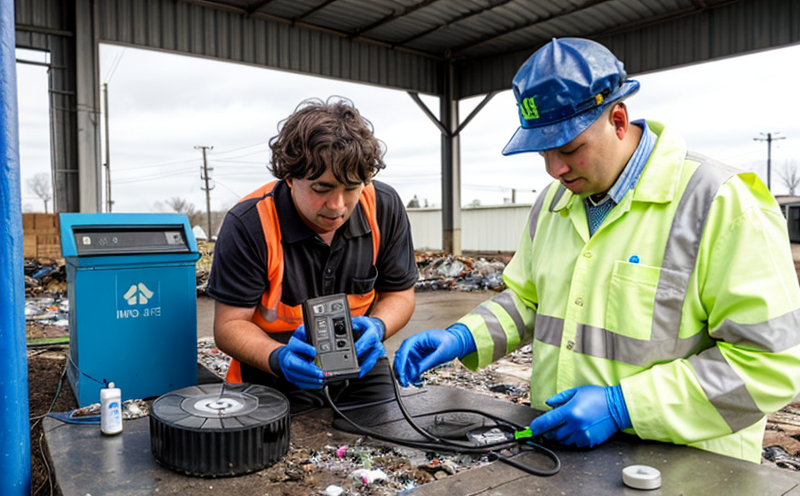NFPA 70B Electrical Equipment End-of-Life Recycling Assessment
The NFPA 70B standard provides a comprehensive approach to electrical safety in industrial and commercial facilities. When it comes to the end-of-life phase of electrical equipment, ensuring safe and environmentally responsible disposal is critical. The NFPA 70B Electrical Equipment End-of-Life Recycling Assessment service ensures that electronic waste (e-waste) and batteries are handled according to best practices and regulatory requirements.
This assessment goes beyond mere compliance; it offers a detailed evaluation aimed at minimizing risks, optimizing resource recovery, and adhering to international standards. Our team of experts uses advanced testing methodologies to assess the integrity of electrical equipment before its final recycling phase. This ensures that only safe components are recycled, preventing potential hazards associated with improper disposal.
The service includes a thorough inspection of the equipment for hazardous materials, evaluation of the recyclable components, and identification of any parts that should be diverted from the recycling stream due to safety concerns. Our team provides detailed reports that outline recommended actions based on our findings. These recommendations help clients make informed decisions about how best to proceed with their e-waste management strategies.
By adhering to NFPA 70B guidelines, businesses can ensure they are meeting regulatory requirements while also contributing positively towards sustainability goals. This service is particularly beneficial for those involved in R&D, quality assurance departments, procurement teams, and compliance officers who need reliable data on the safety and recyclability of electrical equipment at end-of-life.
Our approach leverages cutting-edge technology such as X-ray fluorescence (XRF) spectrometers, gas chromatography-mass spectrometry (GC-MS), and inductively coupled plasma optical emission spectroscopy (ICP-OES). These tools allow us to accurately identify trace elements present within various materials. Additionally, we employ non-destructive testing methods like ultrasonic testing (UT) and eddy current inspection (ECI) which help assess the structural integrity of components without causing damage.
The evaluation process typically involves several key steps: initial survey, sample collection & preparation, analysis using appropriate instrumentation, interpretation of results by our experienced team members, compilation into a comprehensive report, and finally providing recommendations for safe disposal or recycling. Throughout this entire procedure, we maintain strict adherence to industry standards such as ISO 14001:2015 environmental management systems and OHSAS 18001 occupational health & safety management systems.
Eurolab Advantages
- Comprehensive expertise in electrical equipment end-of-life recycling practices.
- State-of-the-art analytical instruments capable of detecting even trace amounts of hazardous substances.
- A dedicated team of engineers and scientists specializing in waste management and electronics recycling.
- Commitment to continuous improvement through participation in international conferences and workshops related to e-waste handling.
- Detailed documentation supporting every assessment conducted, ensuring transparency and accountability throughout the process.
- Customized solutions tailored specifically for individual client needs, whether large corporations or small businesses.
- Supporting sustainable development initiatives by promoting proper disposal methods that reduce environmental impact.
International Acceptance and Recognition
- The NFPA 70B standard is widely recognized in North America but has gained traction globally due to its emphasis on fire safety.
- Many countries have adopted similar standards for electrical equipment, including those from the International Electrotechnical Commission (IEC).
- Our findings are accepted by regulatory bodies worldwide because they adhere strictly to both national and international regulations governing hazardous waste management.
- The methodologies used in our assessments align closely with European Union directives concerning product design and manufacturing practices which focus heavily on sustainability.
Use Cases and Application Examples
| Use Case | Description |
|---|---|
| Data Centers | In data centers, where large amounts of electronic equipment are continuously replaced, regular assessments ensure that only safe components go into recycling processes. |
| Manufacturing Facilities | For manufacturing plants producing electrical products, this service helps identify potential hazards early in the product lifecycle so they can be addressed proactively during design stages. |
| Corporate Recycling Programs | Aids companies implementing corporate-wide recycling programs by providing accurate information about what materials can safely enter the recycling stream and which should be treated as hazardous waste instead. |
| Government Agencies | Supports government agencies responsible for enforcing e-waste regulations by offering expert testimony during compliance audits or legal proceedings involving electrical equipment disposal. |





